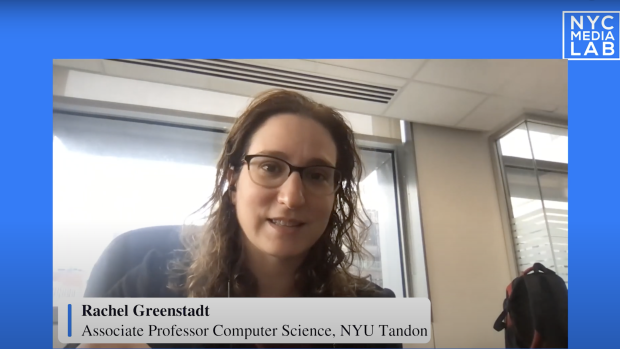Tandon’s cyber-experts weigh in on the perils of digital misinformation
NYC Media Lab hosts a panel on “Misinformation & Disinformation: Factors and solutions for media and tech”

Associate Professor of Computer Science Rachel Greenstadt speaking in NYC Media Lab's webinar on Misinformation & Disinformation
When the NYC Media Lab convened an event to explore trends in disinformation, misinformation, and the technology that is helping combat those phenomena, it was natural for them to call upon experts from the NYU Tandon School of Engineering, a cornerstone of the Lab consortium and home to several researchers studying the pernicious effects of bot-generated social media posts, the opaque nature of many political ads, and the threats to democracy posed by those spreading false information (whether unwittingly or maliciously), among other such topics.
Among the panelists was Laura Edelson, a postdoctoral researcher with Tandon’s Cybersecurity for Democracy initiative and the co-founder of NYU Ad Observatory, a platform that allows users to explore online political advertising by keywords, topic, sponsor, or region to see an analysis of spending, messaging trends, and more. Also on-hand was Associate Professor of Computer Science Rachel Greenstadt, whose areas of expertise include online privacy and the design of trustworthy AI systems.
They were joined by David Klepper of the Associated Press, who explained that while he is now specifically assigned to cover misinformation and disinformation, in reality, every reporter must contend with those dangers.
The panel, moderated by Media Lab Community Lead Matt MacVey, discussed topics ranging from the difference between misinformation and disinformation (it comes down to intent, Edelson explained, with disinformation being spread for the express purpose of sowing fear and mistrust) to the ramifications for U.S. elections.
The news was not all bad: while the researchers touched upon how social media messaging can incite hate for entire demographic groups, the ways in which algorithms can be manipulated to amplify false narratives, and the proliferation of “creepware” that enables stalking and harassment, they also explained that tools and techniques were being created to shed light on — and mitigate — the problems.
The printing press and radio dramatically changed society, they pointed out, and as even newer modes of communication are developed, we must continue to think critically about the information we receive through those channels.




